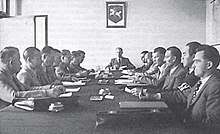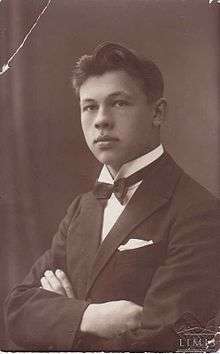Provisional Government of Lithuania
The Provisional Government of Lithuania (Lithuanian: Laikinoji Vyriausybė) was a temporary government aiming for independent Lithuania during the last days of the first Soviet occupation and the first months of German Nazi occupation in 1941.

It was secretly formed on 22 April 1941, announced on 23 June 1941, and dissolved on 5 August 1941.[1] It was formed from the members of the Lithuanian Activist Front (LAF) in Kaunas and Vilnius.
History

_newspaper.jpg)
The Provisional Government was confirmed on 22 June, 1941 at the start of the June uprising. However, the leader of the LAF, Kazys Škirpa, who was supposed to become the Prime Minister, was in Germany at the time, hoping to obtain recognition for Lithuania (he was also former Lithuanian envoy to Germany and therefore continued to reside there). Since the Nazi regime saw Lithuania as a future part of Greater Germany, it was not much interested in Lithuanian independence, but allowed the Provisional Government to operate while it was useful. Kazys Škirpa was not allowed to leave Germany and return to Lithuania to join the government; instead, he was put under house arrest. Rapolas Skipitis, another minister to be who also had been in Berlin at the time was prevented from leaving as well.[2].
Vytautas Bulvičius, who was Minister of Defence, was arrested by the Soviet forces on 2 June. His place was therefore taken by General Stasys Raštikis. On 21 June 1941 (just one day before Germany declared war on the Soviet Union), four members of the planned government were arrested by the Soviets: (Vladas Nasevičius, Vytautas Statkus, Jonas Masiliūnas, and Jonas Vainauskas); they were imprisoned in Gorky prison in Moscow. The tribunal started on 26 November 1941 (after the uprising had ended, and while Lithuania was still occupied by Germany). Sentences were pronounced on 28 November: Bulvičius was executed, while Masiliūnas, Nasevičius, and Statkus were exiled to Siberia, along with other people arrested at the same time.
Literary historian Juozas Ambrazevičius (a.k.a., Juozas Brazaitis) became acting prime minister instead of Škirpa.
The Provisional Government did little to stop the anti-Jewish violence encouraged by the Nazis and the anti-Semitic leadership of the Lithuanian Activist Front. Lithuanian police battalions formed by the Provisional Government helped the Nazis carry out the Holocaust.[3]
The Provisional Government dissolved itself in August 1941 after failing to achieve its goal of an autonomous if not independent Lithuania under German patronage.
The cabinet
The people who were meant to be in the government:[4]
- Prime Minister: Colonel Kazys Škirpa (was prevented from assuming the position and placed under house arrest in Berlin)
- Education/Acting Prime Minister: Juozas Ambrazevičius/Juozas Brazaitis
- Defense: Major Vytautas Bulvičius (arrested by Russians on 2 June, executed in November), later General Stasys Raštikis
- Foreign affairs: Rapolas Skipitis (was not able to leave Berlin)
- Internal affairs: Vladas Nasevičius (arrested by Soviets on 21 June, later exiled to Siberia)
- Finance: Jonas Matulionis
- Health Ksaveras Vencius
- Trade: Vytautas Statkus (arrested by Soviets on 21 June, later exiled to Siberia)
- Industry: Doctor engineer Adolfas Damušis
- Agriculture: Professor Balys Vitkus
- Social security: Doctor Juozas Pajaujis-Javis
- Infrastructure: Engineer Vytautas Landsbergis-Žemkalnis
- Communication: Jonas Masiliūnas (arrested by Soviets on 21 June, later exiled to Siberia)
- Controller of state: Jonas Vainauskas (arrested by Soviets on 21 June)
See also
- Lithuanian Activist Front
- Lithuanian TDA Battalions
- Lithuanian collaboration during World War II
- Lithuanian Soviet Socialist Republic
References
- Jegelevičius, Sigitas (11 June 2004). "1941 m. Lietuvos laikinosios vyriausybės atsiradimo aplinkybės". Voruta (in Lithuanian). 11 (557). ISSN 1392-0677. Archived from the original on May 7, 2006.
- "Kuo reikšmingas 1941 m. birželio 22-28 d. sukilimas?". LLKS.lt. Retrieved 20 June 2014.
- Sužiedėlis, Saulius. "The Burden of 1941". Lituanus Lithuanian Quarterly Journal of Arts and Sciences, Volume 47, No. 4 (Winter 2001).
- Zemlickas, Gediminas (February 11, 1998). "Pasaulyje — kaip savo namuose". Mokslo Lietuva (in Lithuanian). 3 (161). ISSN 1392-7191. Archived from the original on December 12, 2006.